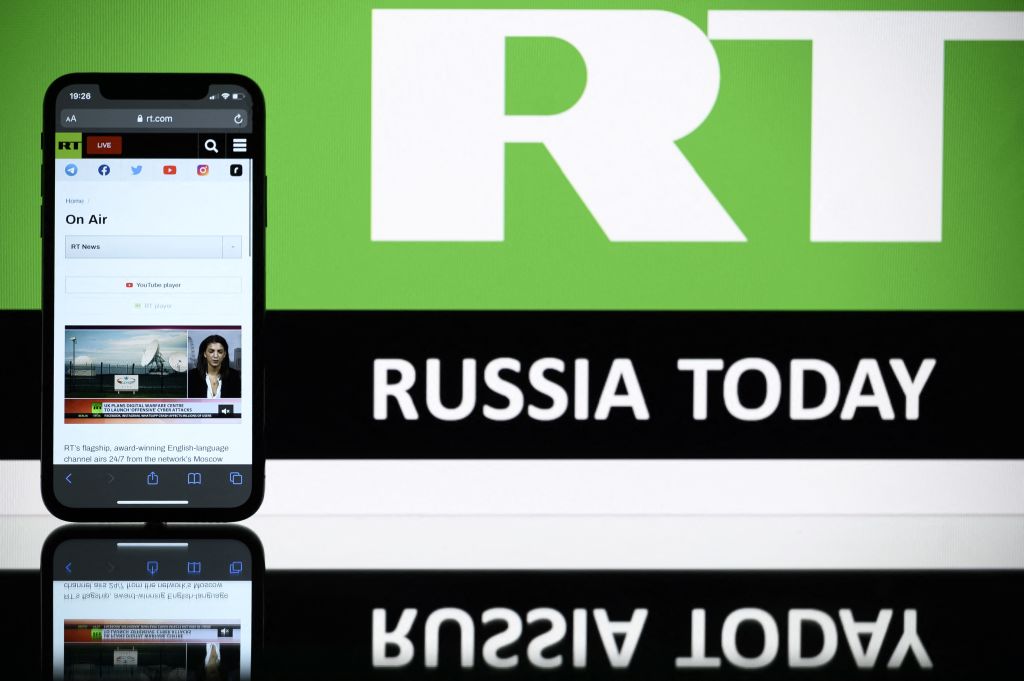On Wednesday morning, as Russia’s unprovoked war against Ukraine entered its seventh day, I turned on Russia Today (RT), the Russian-controlled network that in recent days has been banned in Europe and abandoned by TV operators of all the world.
Founded in 2005, RT, which operates multiple channels, including RT America, has served as one of the largest megaphones for Russian President Vladimir Putin’s propaganda around the world. It offers insight into how the Kremlin wants to portray the world and its role in it.
I watched the channel for several hours and was amazed at the brazenness with which its hosts and personalities went out of their way to mislead their audience and divert attention from the issues at hand.
The main thrust of RT’s coverage presented Russia as a mere victim of Western aggression, a country forced to launch a limited “military operation” after its hand was forced by a high and powerful NATO that showed no interest in take Moscow’s security concerns seriously.
Russia the “liberator”
Peter John Lavelle, host of RT’s talk show “Crosstalk,” put it this way: He said it was the failed “liberal order” implanted by the West that was to blame. “It’s very irritating,” Lavelle said on his show.
“The way it’s being framed: Ukraine’s democracy. Well, it has nothing to do with Ukraine’s democracy, if you can say it has one. It’s about security. There’s only security to other countries”.
On its news programs throughout the day, RT’s on-screen graphics announced breaking news alerts supporting that notion: “RUSSIA: THREATS TO NATIONAL SECURITY LEAVE NO CHOICE BUT TO LAUNCH A MILITARY OPERATION.” Another TV graphic read: “RUSSIA SAYS ITS OBJECTIVES IN UKRAINE ARE TO DEMILITARIZE AND DENAZIFY THE COUNTRY”.
In fact, according to RT, Russia was not even necessarily the aggressor. The channel said at times that Russia was a “liberator”, essentially freeing people from the threatening forces in Kyiv. “MILITIA SAYS 40 TOWNS AND VILLAGES ARE ALREADY FREED IN CURRENT OFFENSIVE,” one graphic declared.
A package that the network aired repeatedly characterized life under Ukraine as unbearable for those living in the Lugansk region. In another package, RT focused on damage to residential buildings in the Donetsk region.
Lack of coverage amid propaganda
The coverage did not focus on how unbearable life has been for Ukrainians whose cities are under attack by ruthless Russian forces. I didn’t see much coverage showing the damage Russian forces have caused in trying to take control of the country.
Or coverage of residents of cities like Kyiv who live in terror and sleep underground in bomb shelters. Or the coverage of the hundreds of thousands of people who have simply decided to flee the country for their safety. Those inconvenient facts were not the emphasis of the Russia narrative and propaganda that RT pushed.
Also left out of RT’s coverage was the ramifications that Western sanctions and other actions are having on Russia’s economy.
Other areas of interest
Although RT turned a blind eye to the uncomfortable facts, it found time to portray Russians who aren’t even in the war zone as victims. One segment focused on how Russians are “facing hostility in Western countries” over the “situation” in Ukraine.
It quoted a man in the UK who said he is “not ashamed” to say he is Russian, but that he is “afraid” and “worried that society has this perception that all Russians are bad”.
On other occasions, RT’s propaganda tried to present Russia as a country that cares a lot about humanitarian issues. The network broadcast a report on how Russia has taken in schoolchildren displaced by the war: “RUSSIAN SCHOOLS HOLD HUNDREDS OF SCHOOLCHILDREN FROM DONBA”/
Set to music in the background, the segment featured interviews with several children expressing their appreciation and saying that Russia was willing to take in many more children.
Consequences in the real world of propaganda
Now that Russia has invaded Ukraine and RT’s role in promoting the Kremlin’s dishonest arguments and propaganda has been exposed, the network is being excluded from public discourse.
Yet this media outlet’s propaganda has been broadcast around the world unimpeded for years and years, coloring the minds of untold numbers of people, many of whom are wary of Western news organizations.
It’s a shame that it takes a war for companies to realize that the programming they broadcast in homes is important. Russia’s real-world war started last week, but its information war started much earlier. Imagine if these companies had acted before how things could be.

